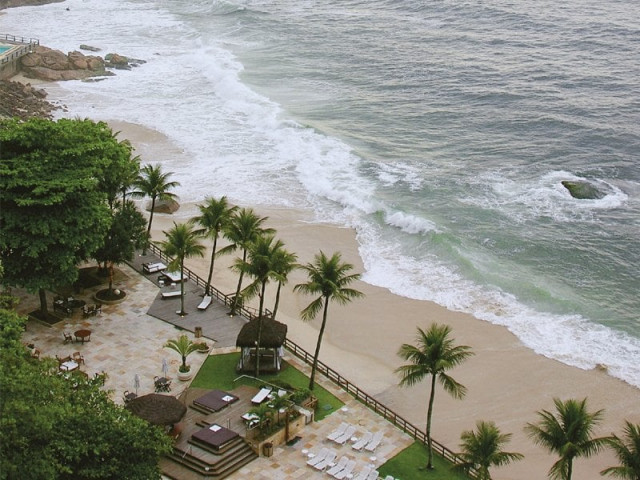Travel: A Brazilian adventure
“Be brave. Take risks. Nothing can substitute for experience.” — Paulo Coelho.

“Be brave. Take risks. Nothing can substitute for experience.” — Paulo Coelho.
My first stop was Sao Paulo, and it was little consolation that the city was second in its crime rate only to Rio de Janeiro — my second stop. But fear soon gave way to curiosity as I landed in the bustling city in late November. Brazil is not only one of the five newly industrialised countries (BRICS) but it is also the upcoming venue for the World Cup and the Summer Olympics. Is it ready for the surge of international visitors? And how much had it changed since my last visit two years ago?

The drive to my hotel in the city centre was overwhelming, and not in a good way. The traffic and the pollution was as bad as in Cairo, only this time I knew I would not be greeted with the majestic view of the Great Pyramids at the end of an interminable drive. The infrastructure is still undeveloped, the hotel wifi was intermittent and the elevators always seemed to be out of service.
And then there was the language barrier. Armed with a few choice Portuguese words and a Google translation app on my iPhone, I set out to embrace this Brazilian adventure. I soon exhausted my limited vocabulary, while the Google app insisted on stringing the words of my sentences in the wrong order! But were it not for this high tech failure, I would never have appreciated the sheer beauty of sign language. After frantic gestures, I would manage to get my point across. In return, I would get a raised thumb and a grin, meaning: I understand you!

Brazil certainly did not cease to amaze me. During one of my excursions to the famous Copacabana beach, overflowing with scantily clad beach goers, lo and behold! I spotted a car sporting the kalima printed in bold black Arabic across the rear windshield. I soon learned that there is a considerable Arab influence in Brazil. Around nine million people, ie five percent of the population, are of Lebanese or Syrian descent.
It is a country full of churches and cathedrals, usually in a blend of Byzantine and German Gothic styles; a country where almost every bookshop proudly displays the risqué Fifty Shades of Grey. Festive revellers in various stages of undress dance on the evenings of the Grand Carnival around the statue of Cristo Redentor (Christ the Redeemer), towering over the city of Rio with its arms outstretched.
Intrigued by the intermingling and seemingly contradictory cultural influences at work in Brazil, I asked the tour guide how the conservative Catholic culture blended with the hedonism on display. How on earth do thongs and theology manage to coexist? The answer, as I discovered, was rooted in Brazil’s colonial history. When the Portuguese colonised Brazil, they observed that the natives wore little clothing and concluded that it was a smart way to dress given the region’s hot and humid climate. “So what we see now,” the tour guide said, “is simply the assimilation of local habits into the Portuguese culture.”

Brazil’s openness to different cultures is also evident in its cosmopolitan cuisine. The posh district of Jardim is full of excellent Italian, French and Lebanese cuisines. Mercado Municipal also has an authentic collection of old-style food shops and restaurants. Just one word of warning: never argue with a Brazilian about coffee. They are fiercely proud of their coffee traditions and were reluctant to serve me decaffeinated coffee even upon request. It’s the closest Brazilians come to fanaticism.
So far so good. But walking in Rua Augusta one afternoon, the heart of Sao Paulo’s night life, I felt my heart jump to my throat. Fifty yards ahead of me, I saw a severed human head pressed to the edge of the sidewalk. My mind refused to accept the image. But relief replaced horror as I got closer to the head and saw the rest of the body, which had been obscured by a traffic sign. The man was very much alive and lying face down, handcuffed in brass with arms stretched backwards. Two policemen were standing guard on either side. From the neighbouring buildings, just about everyone was peering through the curtains, as if watching a circus or a parade. It was a grim reminder of the headlines I had checked before leaving home.
But thankfully, there were many sites of unparalleled beauty to distract you as well. In Jardim Botanica, one of the world’s biggest botanical gardens, the lake is decorated with lily pads, reminiscent of Amazonian flora. Small turtles climb slowly out of the water to laze under the sun, while black monkeys with curvy tails emerge from the bushes.

Two years ago, I had ventured upstream in a small Zodiac boat to view the waterfalls of Iguacu at the border of Argentina and Paraguay. When the boat took me under the falls, I finally understood why Eleanor Roosevelt, when visiting the same location, had remarked: “Poor Niagara.”
And of course, Brazil would not be Brazil without its beaches. These beaches flow into one another, whilst retaining their distinct character. Leblon beach merges with Ipanema, and then with the iconic Copacabana beach made famous by Barry Manilow’s song. From the fourteenth flour of our hotel at Leblon Beach, the view of the pearly waters was mesmerising. But if you were to tilt your head slightly sideways, you would see poverty-infested favelas. The juxtaposition of the haves and have-nots was stark.

After 11 days in Brazil, my fears had taken a backseat. There seemed no other choice, when faced with glistening beaches, waterfalls and a vibrant Brazilian culture. The country had one foot in the twentieth century and the other in the twenty first century. It was one of the world’s fastest growing economies and a country that had kissed goodbye to years of military dictatorship. Some caution and vigilance was necessary given the omnipresence of crime, but it was hard not to admire the ethnic harmony that pervaded Brazilian society.
Published in The Express Tribune, Sunday Magazine, February 10th, 2013.
Like Express Tribune Magazine on Facebook to stay informed and join the conversation.



















COMMENTS
Comments are moderated and generally will be posted if they are on-topic and not abusive.
For more information, please see our Comments FAQ